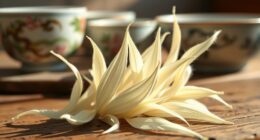I was excited to learn about the numerous advantages of turmeric tea, a natural and healthy remedy that has been used for centuries in traditional medicine due to its anti-inflammatory properties.
But as with any supplement or herbal remedy, it’s important to understand how much you should be consuming each day. In this article, we’ll explore the recommended daily intake of turmeric tea, how to brew the perfect cup, some delicious recipes to try out, precautions and side effects to be aware of, and alternative ways to consume turmeric if you’re not a fan of tea.
So let’s dive in!
Key Takeaways
- The recommended dosage of turmeric tea is two to three cups per day.
- Factors such as age, health status, and medication use should be considered before deciding on a daily intake.
- Pregnant women should limit their intake as high doses of turmeric may cause uterine contractions.
- Individuals on blood-thinning medication should avoid consuming turmeric as it can increase the risk of bleeding.
The Benefits of Turmeric Tea
You’ll be pleased to know that incorporating turmeric tea into your daily routine can provide you with a plethora of health benefits.
Turmeric has been used for centuries in traditional medicine and has recently gained popularity due to its potent anti-inflammatory properties. Drinking turmeric tea on a regular basis can help reduce inflammation in the body, which is linked to various chronic diseases such as heart disease, cancer, and arthritis.
In addition to reducing inflammation, turmeric tea has also been shown to improve brain function and lower the risk of certain cancers. The active ingredient in turmeric, curcumin, has powerful antioxidant effects that can protect cells from damage caused by free radicals.
Overall, drinking turmeric tea is a simple yet effective way to support your overall health and well-being. So now that we’ve covered some of the many health benefits of turmeric tea, let’s talk about how much you should aim to drink each day.
Recommended Daily Intake
When it comes to consuming turmeric tea, there are several factors that need to be considered to ensure safe and beneficial consumption. Factors such as age, health status, and medication use should be taken into account before deciding on a daily intake.
It’s also important to note the safe consumption limits and recommended dosage of turmeric tea. This will help avoid any potential adverse effects.
Factors to Consider
There are several factors to consider when deciding how many cups of turmeric tea to consume in a day, such as one’s health condition and caffeine tolerance. While turmeric tea is generally considered safe for most people, excessive consumption may lead to certain adverse effects. Therefore, it is essential to understand the factors affecting daily intake and the health benefits and risks associated with excessive consumption.
Factors that affect daily intake include an individual’s age, sex, weight, medical history, and medications they are taking. For example, pregnant women should limit their intake as high doses of turmeric may cause uterine contractions. Similarly, individuals on blood-thinning medication should avoid consuming turmeric as it can increase the risk of bleeding. The table below summarizes some key factors affecting daily intake:
| Factors | Description |
|---|---|
| Age | Children under 2 years old should not consume turmeric due to potential gastrointestinal issues |
| Health Condition | Individuals with gallbladder problems or bile duct obstruction should avoid consuming large amounts of turmeric |
| Caffeine Tolerance | Turmeric tea contains no caffeine but mixing it with other teas containing caffeine could result in overconsumption |
Understanding these factors will help determine how much turmeric tea is safe for consumption without any adverse effects. As we move towards discussing safe consumption limits in the next section, it is essential to keep these factors in mind while regulating our daily intake of turmeric tea.
Safe Consumption Limits
It’s important to know the safe consumption levels of turmeric tea, as excessive intake may have potential risks. Here are a few things to keep in mind when it comes to drinking this herbal beverage:
-
According to the World Health Organization (WHO), the acceptable daily intake of curcumin, the active ingredient in turmeric, is 3 mg per kilogram of body weight. This means that an average adult can consume up to 200 mg of curcumin per day without any adverse effects.
-
Turmeric tea should not be consumed by pregnant women or those who are breastfeeding as it may interfere with fetal development and milk production.
-
People with gallbladder problems, kidney stones or diabetes should consult their healthcare provider before adding turmeric tea to their diet.
-
Excessive consumption of turmeric tea may cause gastrointestinal discomfort, nausea and diarrhea.
Knowing these safe limits ensures that you receive all the benefits from drinking turmeric tea without experiencing any negative consequences. In the next section on recommended dosage, we’ll discuss how much turmeric tea is ideal for daily consumption.
Recommended Dosage
To get the most out of your daily routine, aim for a moderate curcumin intake in your turmeric tea. The recommended dosage of turmeric tea is two to three cups per day, as this is enough to provide the health benefits without overloading on the active compound, curcumin. Drinking too much can lead to digestive issues and even liver damage.
Turmeric tea benefits include anti-inflammatory properties, antioxidant effects, and potential cancer-fighting abilities. It may also aid in digestion, improve brain function, lower blood sugar levels, and reduce the risk of heart disease. For specific health conditions such as arthritis or inflammatory bowel disease, higher doses may be necessary under medical supervision. Always consult with a healthcare professional before increasing your intake beyond the recommended amount.
Transitioning into how to brew the perfect cup of turmeric tea involves understanding the importance of quality ingredients and proper steeping techniques. By using fresh ingredients such as grated ginger and high-quality turmeric powder or fresh roots, you can enhance both flavor and nutritional value. Steeping time should be around 10-15 minutes at a temperature just below boiling point for optimal extraction of curcuminoids.
How to Brew the Perfect Cup
When it comes to brewing the perfect cup of turmeric tea, there are a few key factors to consider.
Firstly, choosing the right type of tea is essential – whether you opt for loose leaf or teabags, make sure you select a high-quality blend that’s rich in turmeric and other beneficial ingredients.
Secondly, consider adding other ingredients such as ginger or honey to enhance the flavor and health benefits.
Finally, pay attention to brewing time and temperature and store your tea properly to ensure maximum freshness and shelf life.
Choosing the Right Tea
Choosing the right tea can be a fun and healthy experience. You should definitely consider trying different types of tea to find the one that best suits your taste buds and provides the most benefits for your health.
Tea varieties are numerous, ranging from green to black, white, oolong, herbal, and fruit-infused teas. Each type has its unique flavor profile and nutritional benefits that cater to different preferences.
For instance, if you like bold flavors with a hint of sweetness, then black tea may be the right choice for you. If you prefer a delicate taste with floral notes, white tea could be your go-to option. On the other hand, if you’re looking for a caffeine-free alternative with soothing properties for relaxation or better sleep quality, herbal teas like chamomile or lavender can help.
Experimenting with different types of tea can expand your palate while providing various health benefits suitable for your lifestyle. As you explore different types of tea to incorporate into your daily routine, adding other ingredients such as ginger or lemon can enhance both flavor and nutritional value.
Adding Other Ingredients
Like a painter mixing colors on their palette, adding ingredients such as honey or mint to your turmeric tea can create a unique and flavorful experience. Not only do these ingredients add depth to the taste of your beverage, but they also have potential health benefits.
For example, adding honey has been shown to have antibacterial properties and may help soothe sore throats, while mint is known for its ability to aid digestion and alleviate nausea. There are endless flavor combinations that you can experiment with when it comes to enhancing your turmeric tea.
Some popular options include cinnamon for added warmth and sweetness, ginger for an extra kick of spice, or lemon juice for a tangy twist. Ultimately, the choice of which ingredients to add will depend on personal preference and desired health benefits.
In the next section, we’ll discuss the importance of brewing time and temperature to optimize the potential health benefits of your turmeric tea.
Brewing Time and Temperature
Now that we’ve discussed the benefits of adding other ingredients to your turmeric tea, let’s dive into the importance of brewing time and temperature.
Proper brewing techniques can enhance the flavor and medicinal properties of your turmeric tea. Firstly, it’s important to note that boiling water can destroy some of the beneficial compounds in turmeric. Therefore, it’s recommended to use hot but not boiling water (around 95°C/200°F) when steeping turmeric tea.
As for brewing time, 10-15 minutes is typically enough for optimal extraction of nutrients and flavor. However, longer steeping times may lead to a bitter taste. Understanding proper brewing techniques can maximize both the taste and health benefits of your turmeric tea.
By using hot but not boiling water and steeping for no more than 15 minutes, you can ensure a delicious cup of tea with all its natural goodness intact. Moving forward, let’s explore how to store your turmeric tea to maintain its quality over time.
Storage and Shelf Life
To keep your turmeric tea fresh and flavorful for longer, it’s important to store it in a proper way. Firstly, make sure to store the turmeric tea in an airtight container away from direct sunlight. This will prevent any unnecessary exposure to light or air which can cause the tea to lose its flavor and aroma over time.
Secondly, you should check the expiration date of your turmeric tea before consuming it. Expired tea can not only taste bad but also be harmful to your health.
Proper storage is essential when it comes to keeping your turmeric tea fresh for longer. However, if you find that you have a surplus of unused turmeric tea at home, why not try using it in some delicious recipes? There are many creative ways to incorporate this healthy spice into your meals and drinks, making it a versatile addition to any kitchen.
Turmeric Tea Recipes
Turmeric tea is a delicious and healthy alternative to traditional tea blends, and can easily be made using ingredients found in your kitchen. Not only does it offer a warm and comforting taste, but turmeric also provides numerous health benefits. Some of these benefits include its anti-inflammatory properties which can help reduce pain, improve brain function, and lower the risk of heart disease.
To make the perfect cup of turmeric tea, start by boiling water in a pot or kettle. Add 1-2 teaspoons of turmeric powder or grated fresh turmeric root to the water and let it steep for 5-10 minutes. You can also add other spices such as ginger or cinnamon for added flavor. Strain the mixture into a mug and sweeten with honey or maple syrup if desired. Another great option is to use milk instead of water for a creamy texture – this is known as golden milk! With so many options available, you’re sure to find the best turmeric tea blend that suits your taste buds.
As much as I love drinking turmeric tea every day, it’s important to note that some people may experience side effects such as stomach upset or allergic reactions. In the next section about ‘precautions and side effects’, we’ll explore these potential risks further.
Precautions and Side Effects
It’s crucial to be aware of the potential risks and side effects associated with consuming turmeric, as they can impact your health and wellbeing. While turmeric tea benefits are numerous, it’s important to recognize that there are also some possible negative consequences to drinking too much of this herbal beverage.
Here are some precautions and side effects to keep in mind when drinking turmeric tea:
-
Precautions:
-
Pregnant women should avoid high doses of turmeric as it may stimulate the uterus or cause miscarriage.
-
People taking blood thinners such as Coumadin (warfarin) or aspirin should limit their consumption of turmeric as it may increase bleeding.
-
Side Effects:
-
Turmeric can cause stomach upset, diarrhea, nausea, and dizziness in some people.
-
In rare cases, allergic reactions such as hives and breathing difficulty have been reported.
As you can see, there are both positive and negative aspects to consider when drinking turmeric tea. However, before starting any new dietary supplement or regime, it’s always recommended that you consult with your healthcare provider. In the next section, we will discuss who should avoid turmeric tea altogether.
Who Should Avoid Turmeric Tea
If you have a history of miscarriage or are taking blood thinners, avoiding turmeric tea may be the best choice for your health. Turmeric contains compounds that can interact with certain medications and increase the risk of bleeding. If you’re on blood thinners like warfarin, aspirin, or clopidogrel, it’s important to consult with your healthcare provider before consuming turmeric in any form, including tea.
Additionally, pregnant women should exercise caution when it comes to consuming turmeric tea. While turmeric is generally considered safe during pregnancy when used in small amounts as a spice in food, there isn’t enough scientific evidence to support its safety in high doses or as a supplement. Therefore, it’s recommended that pregnant women avoid taking turmeric supplements or drinking excessive amounts of turmeric tea without consulting with their healthcare provider first.
When considering incorporating turmeric into your diet, it’s important to be aware of potential interactions and risks associated with consumption. However, if you’re still interested in reaping the benefits of this spice but want to avoid consuming it as a tea due to medication interactions or pregnancy concerns, there are alternative ways to consume turmeric such as adding it as a spice to dishes or taking supplements under the guidance of a healthcare professional.
Alternative Ways to Consume Turmeric
I’ve been curious about the safety of turmeric tea for children and whether it’s okay to drink every day.
I also wondered how long it takes for it to work and if adding milk changes its benefits.
After doing some research, I found that while turmeric is generally safe for children, they should not consume more than a small amount per day.
Drinking turmeric tea every day is generally safe as long as it’s consumed in moderation.
It may take a few weeks or months to see noticeable health benefits from drinking turmeric tea, but adding black pepper can help enhance its absorption.
Milk may reduce the bioavailability of curcumin, the active compound in turmeric, so it’s best to avoid adding milk to your cup of turmeric tea.
Is Turmeric Tea Safe for Children?
You may be wondering if turmeric tea is safe for your children to consume. As a parent, you want to make sure that what your child consumes is not only delicious but also beneficial for their health. The good news is that turmeric tea benefits are just as applicable to children as they are to adults. However, there are some things you need to consider before giving turmeric tea to your kids.
Here are three important points about the dosage of turmeric tea for kids:
-
It’s recommended that children consume no more than 1/8 tsp of turmeric per day.
-
If your child is on medication or has any medical condition, consult with a doctor before giving them turmeric tea.
-
Start with small amounts and gradually increase the dosage over time.
Now that we’ve covered the dosage for kids, let’s talk about whether it’s safe for adults to drink turmeric tea every day.
Can I Drink Turmeric Tea Every Day?
Go ahead and add some spice to your routine by making turmeric tea a daily habit. This vibrant yellow drink has a wide range of health benefits, from reducing inflammation to boosting brain function. However, as with any supplement or dietary change, it’s important to be mindful of any potential risks.
While turmeric is generally considered safe in the amounts typically used in cooking and supplementation, there are some potential side effects that may arise from consuming large amounts over an extended period of time. These include digestive issues such as nausea and diarrhea, as well as increased risk of bleeding for those on blood-thinning medications.
It’s also important to note that while turmeric has been shown to have many positive effects on the body, more research is needed to fully understand its long term effects when consumed in daily habits.
As you consider incorporating turmeric tea into your daily routine, it’s important to weigh the potential benefits against these possible risks. With moderation and careful monitoring of any symptoms that may arise, you can enjoy all the goodness that this powerful spice has to offer. So go ahead and sip away – but keep an eye out for any unexpected changes in your body!
When it comes to seeing results from drinking turmeric tea regularly, timing is key. But how long does it take for turmeric tea to work? Let’s explore this question further in the next section.
How Long Does It Take for Turmeric Tea to Work?
Previously, we discussed the question of whether it is safe to drink turmeric tea every day. Now that we know it’s generally safe, the next question is: how long does it take for turmeric tea to work?
The answer to this question depends on a number of factors, including the individual’s health condition and the dosage of turmeric being consumed. Turmeric contains an active ingredient called curcumin, which has been shown in studies to have anti-inflammatory and antioxidant properties. However, curcumin is not easily absorbed by the body, so consuming turmeric alone may not be enough to experience its full benefits. To help enhance the effectiveness of turmeric tea, there are a few things you can do:
| Strategy | Explanation |
|---|---|
| Add black pepper | Piperine in black pepper enhances curcumin absorption |
| Pair with healthy fat | Curcumin is fat-soluble, so pairing with healthy fats like coconut oil or ghee can aid absorption |
| Use quality ingredients | Choose high-quality organic turmeric and fresh ginger for maximum potency |
As for dosing, it’s generally recommended to consume up to 3 grams of ground or grated turmeric per day. This equates roughly to one teaspoon daily if using ground powder. It’s important to note that higher doses may increase the risk of side effects such as gastrointestinal upset or bleeding disorders. As with any supplement or medication, it’s best to consult with a healthcare provider before starting regular consumption.
While there isn’t an exact timeline for when you’ll start feeling the effects of drinking turmeric tea regularly, incorporating strategies such as adding black pepper and healthy fats can help enhance its effectiveness. It’s also important to stick within recommended dosage guidelines and be mindful of potential side effects. Next up: Can I add milk to my turmeric tea?
Can I Add Milk to Turmeric Tea?
Now, if you’re wondering whether it’s okay to add milk to your turmeric tea, the answer is yes! Adding milk can actually enhance the flavor and make it creamier. In addition, milk contains calcium which is essential for strong bones and teeth. Moreover, adding milk can also increase the absorption of curcumin (the active compound in turmeric) as curcumin is fat-soluble.
However, if you’re looking for a healthier option or trying to cut down on calories, you might want to skip the milk and opt for honey instead. Honey has anti-inflammatory properties that complement those of turmeric perfectly. It also adds a natural sweetness without adding extra calories or fat. Nonetheless, both options have their own benefits and it really depends on personal preference. Ultimately, what matters most is that you enjoy your turmeric tea with or without milk/honey and reap its numerous health benefits.
Moving forward into additional resources, there are many recipes available online for making different variations of turmeric tea with ingredients such as ginger, lemon, and black pepper. These resources can provide further information about the different ways in which you can personalize your turmeric tea according to your taste preferences while still gaining all its incredible health advantages.
Additional Resources
When it comes to learning more about turmeric and its benefits, there are a variety of resources available. Recommended readings, online sources, video tutorials, and expert advice can all provide valuable information on the topic.
Personally, I’ve found these resources to be incredibly helpful in understanding the multitude of ways in which turmeric can improve health and wellness.
Recommended Readings
If you’re looking for more information on the health benefits of turmeric tea, check out these recommended readings. One resource that I highly recommend is "Turmeric for Health: 100 Amazing and Unexpected Uses for Turmeric"by Britt Brandon. This book provides an in-depth look at the various ways that turmeric can be used to improve your health, including its potential benefits for reducing inflammation, boosting brain function, and improving digestion. It also discusses some of the potential side effects of consuming turmeric and provides tips on how to use it safely.
Another great resource is a research article titled "Turmeric (Curcuma longa): Effects of Curcuminoids on Skin Health"by Rattanamanee Chavalit and colleagues. This article explores the potential benefits of using turmeric topically as well as consuming it orally for skin health. The authors discuss how curcuminoids found in turmeric can help improve skin conditions like acne, psoriasis, and eczema. They also provide evidence showing that consuming turmeric internally may help protect against skin damage caused by UV radiation.
Moving onto online sources, there are many reputable websites such as Healthline and WebMD that provide information on the health benefits and potential side effects of drinking turmeric tea. These sites often feature articles written by experts in the field who have conducted extensive research on the subject. By digging deeper into these resources, you can gain a better understanding of how this powerful spice can positively impact your overall wellbeing.
Online Sources
After reading the recommended readings about turmeric tea, I decided to look for more information online. I found various sources that discussed the health benefits of drinking turmeric tea and its recommended daily intake. The online sources also highlighted factors that should be considered before consuming turmeric tea, such as safe consumption limits, recommended dosage, brewing techniques, and tea selection.
To ensure safe consumption of turmeric tea, it’s essential to follow the recommended daily intake and dosage. It’s also crucial to consider any potential side effects or precautions before consuming it regularly. Additionally, alternative consumption methods such as adding milk or using different recipes can enhance the taste and provide additional health benefits.
Through my research on buying turmeric tea online and reading reviews from other users, I was able to find high-quality options that met my needs.
As I continued my search for information about turmeric tea consumption safety, I stumbled upon helpful video tutorials that provided expert advice on brewing techniques and additional resources for learning more about this topic.
Video Tutorials
You can enhance your knowledge about brewing turmeric tea and its health benefits by watching expert video tutorials. There are a plethora of video tutorials available online that showcase the various brewing methods of turmeric tea.
These videos provide step-by-step instructions on how to make the perfect cup of turmeric tea, along with information on the various health benefits it offers. Turmeric tea health benefits are numerous and well-documented. It’s known for its anti-inflammatory properties, which helps in reducing joint pain and inflammation.
Turmeric tea also aids digestion, boosts immunity, promotes heart health, and may even prevent cancer. By incorporating turmeric tea into your daily routine, you can improve your overall wellbeing. So why not learn from experts by watching these informative video tutorials?
When seeking expert advice on brewing turmeric tea and understanding its potential benefits, it’s important to consult reliable sources. In the next section, we’ll discuss some credible online sources that can provide comprehensive information on this topic.
Expert Advice
Don’t miss out on valuable insights from experts in the field when it comes to brewing and understanding the health benefits of turmeric tea. It’s important to seek expert opinions before consuming turmeric tea as it can interact with certain medications and may not be appropriate for people with specific health conditions.
Experts suggest limiting consumption to no more than three cups a day, as excessive intake may lead to stomach issues such as nausea or diarrhea. Additionally, pregnant women should avoid consuming large amounts of turmeric tea due to its potential effects on uterine contractions.
As with any new dietary supplement, it’s important to consult with a healthcare professional before incorporating turmeric tea into your daily routine. By following these guidelines and seeking expert advice, you can safely enjoy the many benefits that turmeric tea has to offer while minimizing any potential health risks.
Frequently Asked Questions
Is it safe to consume turmeric tea during pregnancy?
As a healthcare professional, I recommend exercising caution when consuming turmeric tea during pregnancy. While it may have health benefits, more research is needed to determine its safety for pregnant women. Always consult with your healthcare provider before incorporating turmeric tea into your diet.
Can turmeric tea help with weight loss?
Turmeric tea may aid in weight loss by boosting metabolism and improving gut health. However, more research is needed to determine its effectiveness. As with any dietary changes, moderation is key for optimal results.
Does turmeric tea have any impact on blood pressure levels?
Before increasing turmeric tea intake, consider its possible side effects. Studies on its effects on blood pressure levels are limited, but some suggest benefits. Recommended dosage varies based on individual needs.
Can turmeric tea interact with certain medications?
Turmeric tea can interact with certain medications, such as blood thinners and diabetes drugs. Consult a healthcare provider before consuming turmeric tea if taking medication. Dosage recommendations vary based on individual health needs.
How long does the brewed turmeric tea last?
Brewed turmeric tea can last up to 3 days in the refrigerator. To extend its shelf life, store it in an airtight container and keep it away from sunlight. Reheat before drinking for best taste and benefits.
Conclusion
In conclusion, turmeric tea is a delicious and healthy beverage that can provide numerous benefits to our bodies. However, it’s important to consume it in moderation and follow the recommended daily intake. As I’ve mentioned earlier, drinking 1-2 cups per day is considered safe and effective in reaping its health benefits.
Interestingly, recent studies have shown that turmeric may also improve brain function and reduce the risk of cognitive decline. In fact, one study found that consuming 1 gram of turmeric for 6 months resulted in significant improvements in memory and attention among older adults with mild cognitive impairment. This statistic highlights the potential of this spice not only as a culinary ingredient but also as a natural supplement for brain health.
Overall, incorporating turmeric tea into our daily routine can be an easy way to boost our overall well-being. Just remember to follow precautionary measures and consult your doctor if you have any underlying medical conditions before adding it to your diet.










